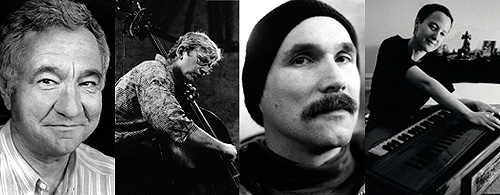Berkeleyan
 The University of California is home to a quartet of internationally known improvisers: left to right, David Wessel, director of Berkeley's Center for New Media and Audio Technologies and electronics maestro; bassist Mark Dresser (UC San Diego); electronics innovator Bob Ostertag (UC Davis); and pianist Myra Melford (Berkeley). |
'The situation is always changing'
Improvisers from three UC campuses unite here this weekend for an evening of inventive, unpredictable sounds
![]()
| 08 February 2006
David Wessel, director of the Center for New Music and Audio Technologies (CNMAT), knows an opportunity when he sees one. In the fall of 2004, when a trio of premier musical improvisers joined the faculty at various UC campuses, his impulse was to form a group and arrange performances at each musician's academic home.
Wessel knew pianist Myra Melford, bassist Mark Dresser, and electronics innnovator Bob Ostertag even before the musicians came to the University of California. All three musicians were game to work together, so with some funding from the UC Institute for Research in the Arts, the foursome formed a far-flung quartet. The group will make its Berkeley debut this Saturday at Hertz Hall.
Dresser's, Melford's, Ostertag's, and Wessel's CVs read like a Who's Who from the world of improvisation and jazz. Dresser, a professor of music at UC San Diego, has played with avant-garde musician/composer John Zorn, saxophonist/composer Anthony Braxton, saxophonist Jane Ira Bloom, and violinist Mark Feldman, among others. Melford, assistant professor of jazz and improvisation at Berkeley, has performed and recorded with violinist/composer Leroy Jenkins, Art Ensemble of Chicago member Joseph Jarman, and clarinetist/saxophonist Marty Ehrlich. Ostertag, associate professor of technocultural studies at UC Davis, has also worked with Braxton and Zorn as well as with Fred Frith, the Kronos Quartet, and heavy-metal rocker Mike Patton. Wessel, a professor of music at Berkeley since 1988, has collaborated with numerous improvisatory composers, including Ushio Torikai, avant-garde multi-instrumentalist Roscoe Mitchell, saxophonist Steve Lacy, and new-music baritone Thomas Buckner.
When the group performs at Hertz Hall this Saturday, its program will consist of solo, duo, trio, and quartet pieces. Wessel and Ostertag will both be creating sounds from instruments likely to be unfamiliar to many audience members. Wessel will be using a device called a Thunder, designed by Don Buchla, one of the original synthesizer pioneers. The six-sided instrument (which doesn't remotely resemble an acoustic instrument) responds to the pressure and position of the musician's hand, transmitting that information via MIDI to computer software that generates melodies, harmonies, timbres, and rhythms.
New stylus in music
Ostertag will be using a game controller - think joystick - hooked up to a laptop loaded with musical software that he's developed. He'll also be manipulating a stylus on a Wacom drawing tablet to produce sounds. Similar to Wessel's Thunder, the tablet will respond based on the pressure and gestures Ostertag makes with his pen.
Though Melford will be playing a piano, it too has been enhanced with a computer tool. Wessel, who's been working with Melford on the piano preparation, says that the key feature is that she will be able to "compose the prepared aspect of the piano sound and control its role in performance."
Dresser has designed his own electronics to capture sounds that are not typically audible on unmodified contrabasses. Normally, string players have one pickup or microphone by their instrument's bridge. Dresser's bass has three pickups: one by the bridge, another at the far end of the instrument's neck, and a third buried under the neck.
The group played its first concert together last fall at UC San Diego. While each of the musicians has worked in the jazz medium, they won't be drawing from that particular palette at Hertz Hall. Their performance, however, will be far from a free-for-all. "In each work there's a very specific territory that enormously constrains the way the improv can go," Wessel explains. "I liken what's going on in the performance to a basketball game." In both improvisation and basketball there's structure, he says. In basketball, "the players are trying to act collectively, and the overarching goal is to win the game." An improvisational concert is similar, says Wessel: "The situation is constantly changing."
Mark Dresser, Myra Melford, Bob Ostertag, and David Wessel will be performing at Hertz Hall on Saturday, Feb. 11, at 8 p.m. as part of Cal Performances' 20th Century Music and Beyond series. Tickets, priced at $22, are available through the Cal Performances box office at Zellerbach Hall; at 642-9988 to charge by phone; at www.calperfs.berkeley.edu; and at the door.

